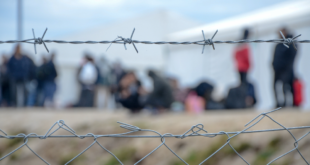President-elect Joe Biden has said he will stand up to China and Russia, but unlike President Trump, he has stressed the need to work closely with allies and international organizations to present a united front against two countries that Washington considers its foremost competitors.
The Trump administration viewed competition with China and Russia largely through a realpolitik lens, christening a new era in foreign policy as one of “great power competition.” Biden is more likely to cast the matter in ideological terms, seeing the situation not just as a contest among nations for power, but also as a struggle of like-minded democracies against rising authoritarianism.
Biden will inherit significant challenges. U.S. relations with Beijing and Moscow are more acrimonious than they have been in decades, and the president-elect has signaled little intention to soften Washington’s approach. China possesses increasingly sophisticated technology, creating a challenge for a U.S. government whose defense budgets are likely to be constrained by stimulus spending. Russia has shown an appetite for geopolitical adventurism, which could challenge Biden the same way Moscow’s invasion of Ukraine vexed the Obama administration in 2014.
Biden is likely to reassert human rights as a key plank of his foreign policy toward China and Russia. Although the Trump administration imposed sanctions on China and Russia for human rights abuses, and the State Department issued condemnatory statements, Trump has been largely silent and at times seemed to side with the nations’ authoritarian leaders.
According to John Bolton, Trump’s former national security adviser, in private conversations with Chinese leader Xi Jinping, the president appeared to endorse the use of internment camps for Uighur Muslims in Xinjiang province. Trump also bonded with Russian President Vladimir Putin over their shared hatred of the news media, despite long-standing concerns about press freedom in Russia.
In a Dec. 2 interview with New York Times columnist Thomas Friedman, Biden said he wouldn’t immediately undo the 25 percent tariffs that the Trump administration placed on an array of Chinese goods or an initial deal requiring China to buy $200 billion in U.S. goods and services over two years. Biden said he would have a period of review.
“The best China strategy, I think, is one which gets every one of our — or at least what used to be our — allies on the same page,” he said. “It’s going to be a major priority for me in the opening weeks of my presidency to try to get us back on the same page with our allies.”
The Biden administration is also unlikely to immediately reverse the restrictions Trump has imposed on Chinese technology firms, although Biden will probably work more closely with U.S. allies to promote alternatives to Chinese products.
Biden has said he will focus on ending China’s coercive economic tactics, including intellectual property theft and aggressive government subsidies for Chinese corporations. He also has called for an ambitious industrial policy in the United States that would invest in American infrastructure, energy, biotech and other sectors to compete with China from a position of strength at home.
“The most decisive factor in the economic competition with China is U.S. domestic policy,” Kurt Campbell, a top State Department official during the Obama administration, and Jake Sullivan, Biden’s incoming national security adviser, wrote in a 2019 article in Foreign Affairs magazine. They said that the notion of a new “Sputnik moment” may be overstating the point, but that the United States must compete with China by investing in American economic and technological leadership at home.
On Russia, Biden will enter office with a little more than two weeks until the expiration of New START, a treaty between Washington and Moscow that limits strategic nuclear arms. Where Trump sought to negotiate a new accord, Biden has said he will sign a five-year extension of New START with Putin, and then pursue other arms-control initiatives with Russia.
Biden has also suggested changing U.S. nuclear doctrine to state that the sole purpose of American nuclear weapons is to deter or respond to a nuclear attack by an adversary, a departure from the current U.S. nuclear doctrine that probably would meet opposition from parts of the U.S. military and Republican lawmakers in Congress. President Barack Obama considered a similar “no first use” doctrine at the end of his administration but ultimately backed off.
Unlike Trump, who regularly denigrated NATO, Biden for decades has been a strong proponent of the alliance and will seek to reestablish trust with European allies and continue to shore up NATO’s defenses against Russia.
“The Kremlin fears a strong NATO, the most effective political-military alliance in modern history. To counter Russian aggression, we must keep the alliance’s military capabilities sharp while also expanding its capacity to take on nontraditional threats, such as weaponized corruption, disinformation, and cybertheft,” Biden wrote in a January article in Foreign Affairs. “We must impose real costs on Russia for its violations of international norms and stand with Russian civil society, which has bravely stood up time and again against President Vladimir Putin’s kleptocratic authoritarian system.”
Biden is also likely to reengage in Ukraine, where as vice president he promoted anti-corruption and pro-democracy movements in the country in the face of pushback from neighboring Russia. Similarly, he is likely to be more vocal than Trump has been in supporting pro-democracy struggles against authoritarianism in places such as Belarus and Hong Kong.
Broadly speaking, the Biden administration is expected to continue the U.S. military’s focus on preparing for possible conflict with China or Russia. But with the need for large government stimulus packages during the coronavirus pandemic, the Pentagon may not enjoy the escalating budgets it has experienced during the Trump administration. The need to make cuts and hard choices could roll back parts of a 30-year modernization of the U.S. nuclear forces started under Obama.
 Eurasia Press & News
Eurasia Press & News



